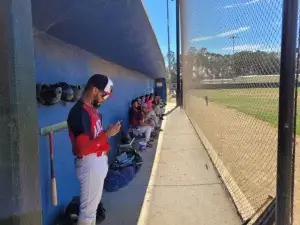Being a good teammate can help you and your team play better
When we step on the field, we all want success. We want to do well on the field, and at the plate. But ultimately, what defines our success as players is the end result on the scoreboard. There are numerous ways in which we stand as individuals during a game. When we throw a pitch or step up to bat. But those individual actions are only a cog in the machine that is a team effort. To win ball games, you need everyone on the team giving their best individually and as part of the whole. Part of being a good teammate is to set an example for the rest of the squad.
Whether you are playing in a league or a tournament, your team cohesiveness will be a factor in how well your squad performs. Disconnected teams make more mistakes and miscommunications. They play as a group of individuals instead of parts of a whole. On the other hand, teams with a good bond play better together. Familiarity and a united goal can make a good team better. You can help your club become more solidified by being a good teammate.
We all want to win. That means putting in the practice. Getting prepared both mentally and physically. It takes execution in the game when it counts. But there are other factors that can help to make a team successful. Leadership, cohesiveness and a common goal gives a team focus. A good teammate will be part of what helps their team reach this focus, through their conduct on the field and in the dugout.

Be a team leader
Nobody joins a squad intending to frustrate their teammates. At the same time, not enough players go in with the intent to be the teammate their club needs. Especially when new to a team, players are often just there to play. This is especially true in youth and amateur adult baseball where a player is just happy to have a team to play on. Their focus isn’t about how they fit into the team’s system or the team chemistry. They might be fighting for a spot in the order or trying to be the starter at a certain position. They are putting their energy into their play on the field.
There’s nothing wrong with that. In fact every player on every team should be balling out to be the best player they can be. But taking account of how you influence your teammates will get your team closer to it’s potential. Those that put in the effort to raise the play of those around them, while improving themselves, are the true leaders of the team.
Team Leaders aren’t always the best player on the field. They aren’t always the biggest, fastest or strongest. Leaders are the ones on the team that motivate and elevate the team through their actions and interactions with their teammates. The leaders are the ones getting the extra reps in practice and encouraging their teammates to do the same. They hustle even when it’s not expected of them.
Set an example
Leaders breed more leaders. They are a good example to their teammates. Set the tone for the team. As more players follow your lead, more and more of the team buys into the effort. Being a leader isn’t something you announce or are chosen for. It’s something that happens when you earn it through your actions.
Sadly, not all teams have players that rise to that leadership. I’ve seen too many teams that remain disjointed because there’s no one for them to rally around. Those teams are filled with a bunch of individuals, all going their own way. While they may get a win here or there, they rarely find consistent success.
Be a team leader. The best teams have every one of their players filling that role in some capacity.

do’s and don’ts for teammates
Do: Be on time—that means early.
Whether it’s practice or a game, be at the field and ready to go at the scheduled time. That gives you and your teammates a chance to stretch, warm up and prepare without eating into practice time or forcing everyone to rush before game time.
Don’t: Make the team wait on you.
Being late takes away practice time and can affect pregame by giving your coach more to worry about.
Do: Give a full effort.
In training, team practice or a game, always give a full effort. Push yourself to get better. Hustle on and off the field and during every play. Your teammates are watching.
Don’t: Take plays off.
If you are on the field, your team is counting on you. It potentially hurts your team anytime you aren’t playing at your best. That’s true if the ball is hit to you. But its also true when it’s not. Your team needs you to be in your cut off or back up spot. Don’t assume you aren’t needed on any play.
Do: Encourage your teammates.
When others on your squad do good, celebrate them. If they don’t, encourage them. Errors and bad at-bats happen. Lift up your teammates.
Don’t: Talk down to your Teammates, especially in front of others
When someone messes up, they probably already know it. If it’s something that needs to be addressed, let the coach handle it, or talk to them about it in private after the game or practice. Don’t tear them down in front of others. It doesn’t help them, you or the team.
Do: build relationships
You don’t have to be friends with all or any of your teammates off the field (though its great when you are). But on the field and in the dugout, building good relationships with other players is an important part of being a good teammate. When your teammates know you care and have their back, they will play with better confidence. Build the team’s morale whenever possible.
Don’t: Be a loner or a diva
Baseball is a team sport. Yes, you could just show up, play, ignore your teammates and just worry about yourself. But no game is ever won by just one player. You need them and they need you. In the long run, team chemistry will matter for your team’s success. Share the good and the bad moments with your teammates.
Do: Practice good sportsmanship
It’s ok to celebrate or be frustrated. But, don’t go overboard. It’s good to be happy when you make a great play or have a good hit. It’s also good to hold yourself accountable when you mess up. Showing your emotions is good if you can control them. If you can’t, take the time to figure out how.
Don’t: Be a bad sport
Celebrating is good. Rubbing it in to the other team isn’t. Tearing down others is a low character move. Often, it will comeback to bite you. Likewise, if you are throwing your bat, helmet or glove after a bad play or at bat, it shows your opponent that they are getting to you. It also can affect your teams morale. Let your coach deal with the umpire. Don’t make problems for your team by yelling or arguing with the blue. Stay in control. Be confident, not arrogant.
Do: Play with confidence.
Have confidence in yourself and your abilities. You’re not going to have success every time. But your chances of doing well are much better when you believe in yourself. Your teammates will feed off this and be more confident themselves. This game will make you humble. Accept that gracefully. But, go into your next opportunity knowing you have what it takes to succeed.
Do: Be a leader through your example.
Be the first one at the field. Train, practice and play with intensity. Know what to do before every play. Be prepared before you step in the on deck circle. Build your interactions on the field. Whether it’s double play conversions, cut offs or pitcher/catcher exchanges, the more you build familiarity, the better you will execute when it counts. Build up your teammates. Be a team player. Hustle. Be accountable for your own play. Be your team’s biggest fan.
Do: Be a great teammate!!

It takes a team to find success. Every player has a part in the outcome of every game. Your team chemistry and morale will have a big impact on your ballclub’s play on the field. Put you and your team in the best position to win. Be the teammate your dugout needs.
